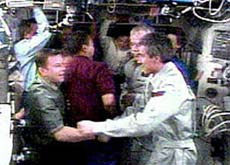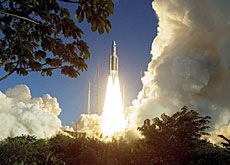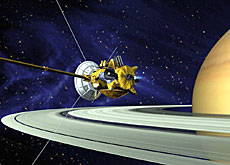Shuttle woes threaten future of space station

Switzerland fears that continuing problems with the space-shuttle programme are endangering the future development of the International Space Station (ISS).
Pascal Vinard, the country’s permanent delegate to the European Space Agency (ESA), told swissinfo that the latest setback also meant the Hubble space telescope was unlikely to be saved.
The space shuttle Discovery, which took off from the Kennedy Space Center in Florida on July 26, is due to return to Earth on Tuesday, a day later than planned because of adverse weather conditions.
But the latest flight – the first since the loss of the Columbia space shuttle and all seven of its crew in February 2003 – has been beset with difficulties.
Damage to Discovery during take-off has led to the grounding of the shuttle fleet, with Nasa stating that other orbiters would not be safe to fly until changes were made to the launcher system.
Vinard believes that the prospect of further delays to the shuttle programme spell big trouble for the ISS and the ESA’s Columbus space laboratory, in which Switzerland has a stake. The space laboratory is completed and waiting in Bremen, Germany, to be flown up to the ISS.
The grounding of the fleet is also likely to put paid to hopes of extending the life of Hubble, which has been in space for 15 years.
swissinfo: The space-shuttle programme is continuing to experience serious problems. What does this mean for the future of the ISS?
Pascal Vinard: It’s clear that the difficulties the United States is having with the current shuttle programme are putting the development of the ISS at risk. The cargo bay of the shuttle is the only transportation system big enough to carry larger elements to the ISS.
But even without these latest problems it was clear that the priorities at Nasa have shifted from the ISS to manned exploration of the Moon and Mars, and possibly other planets of the near solar system.
swissinfo: Nasa has grounded the shuttle fleet. What is the likelihood that it will stay there for some time?
P.V.: I think there is a 50/50 chance that it will stay grounded for a longer period of time. Much will depend on whether Discovery makes it back and how serious the problems were in orbit. One thing is obvious: if there is another accident, there will be no more shuttle flights. If we don’t have an accident and everything is fine, I think they will continue with the next few shuttle flights as foreseen, but with a reduced number of flights and further delays.
The most negative scenarios are that there will only be a few more shuttle flights, which would not be enough to bring up the Columbus laboratory and complete the ISS, or the US simply pulls out of the ISS. This dark scenario cannot be ruled out for the time being.
Another consequence of no more shuttle flights would be the end of the Hubble space telescope. With what has happened to Discovery, I think the last hopes are gone.
swissinfo: Has the shuttle programme turned out to be a failure?
P.V.: The two main objectives of the shuttle programme have failed. The first was to bring down the costs of getting crews and payloads into orbit, and the second was to increase the level of safety for crew members. Neither has been achieved.
But while the programme has reached a dead end in terms of making space-exploration systems cheaper and more reliable, the shuttle has been a technological success. All the re-entry technology and complex docking mechanisms will not be lost. There have also been many technological by-products from the Nasa programme, especially for the defence industry such as the development of stealth fighters, for example. The technology transfer from the shuttle has definitely worked out.
swissinfo-interview: Adam Beaumont
Pascal Vinard is Switzerland’s permanent delegate to the Paris-based European Space Agency.
He is also vice-chairman of the ESA Space Exploration Board “Aurora”.
Switzerland is one of 17 ESA member states and contributes around SFr130 million ($103 million) to the agency’s annual budget of more than SFr4 billion.
Discovery blasted off on July 26 from the Kennedy Space Center in Florida on the first shuttle mission since the Colombia accident in 2003.
The seven-strong crew have had to carry out repairs on the orbiter after it was damaged during take-off.
An astronaut completed a six-hour space walk to remove two protruding ceramic strips from the shuttle’s heatshield. Nasa believes the delicate operation should ensure a safe return on Tuesday.

In compliance with the JTI standards
More: SWI swissinfo.ch certified by the Journalism Trust Initiative












You can find an overview of ongoing debates with our journalists here . Please join us!
If you want to start a conversation about a topic raised in this article or want to report factual errors, email us at english@swissinfo.ch.